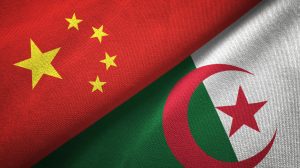Chinese leader Xi Jinping’s meeting with Algerian President Abdelmadjid Tebboune on July 18 added to a flurry of recent high-profile exchanges between China and key Russian allies. In May, Xi chaired the first China-Central Asia Summit, gathering the region’s five heads of state in Xi’an. In July, Iran joined the Shanghai Cooperation Organization (SCO), a group founded by Russia and China. Iran has surfaced as one of Russia’s staunchest supporters during its war against Ukraine, supplying Putin with hundreds of attack drones. Also in July, it was announced that Belarus is expected to complete SCO accession procedures by the end of 2024.
Algeria is perhaps a more complicated case. The nation has longstanding ties to both Russia and China, and its relations with the United States have been frigid ever since the presidency of Donald Trump.
As Reuters noted, relations between Algeria’s governing National Liberation Front (FLN) and the Chinese Communist Party can be traced all the way back to the Algerian War of Independence. China supported the FLN both before and after Algeria’s independence, and it was the first non-Arab country to recognize Algeria’s provisional government. More recently, Algeria was the first Arab nation to form a comprehensive strategic partnership with China in 2014.
Similarly, the foundations for Algeria’s cordial relations with Russia were laid during the Cold War period. The USSR, like China, welcomed Algeria’s independence, quickly providing the country with massive loans and various types of assistance. The USSR was also Algeria’s largest arms supplier, a role Russia retains today. In fact, Algeria is the third largest importer of Russian weapons in the world, which is staggering given that the first and second place are occupied by India and China – countries whose populations exceed Algeria’s more than 30-fold.
Russia’s ongoing invasion of Ukraine, however, now threatens to undermine the strongest pillar of its relations with Algeria and presents a new opening for China. Although Tebboune visited Moscow this June to sign a declaration on “deep strategic partnership,” it is evident that Russia faces a shortage of arms to continue its war effort, with obvious repercussions for its arms exports.
According to the North Africa Post, the war has derailed a $7 billion deal to buy Russian arms and has left Algerian officials scrambling to make up for the shortfall. The newspaper further observes that Algeria’s chief of staff Saied Chengriha “visited France as well as Brazil to seal supply deals.”
Is Tebboune’s visit to China part of the same initiative? Perhaps. On the one hand, Algeria must be aware that China’s military exports have declined in recent years. Commentators have posited multiple reasons for this, including COVID-19 disruptions or stockpiling due to geopolitical tensions and possible plans to invade Taiwan. On the other hand, Algeria has lately been increasing its imports of advanced weapons from China, and the two countries’ most recent joint statement stressed their desire to strengthen cooperation on security and national defense.
These moves reflect a broader pattern in China’s relations with Russian allies. Beijing denies wishing to compete with Russia or displace it in what Moscow sees as its traditional domains, and the two countries’ interests align in areas like security and anti-terrorism. Indeed, there is some hope in Russia and fear in the West that the two powers will create a political bloc to challenge the liberal order. However, this has not stopped countries like Kazakhstan from trying to hedge between the two powers, or as might be Algeria’s case, to try to have China make up for Russia’s current disengagement globally.
If China’s challenge to Russian interests in Algeria is still somewhat hazy, its threat to the interests of the United States is less so. In their joint statement, China and Algeria expressed their support for the self-determination of the people of Western Sahara, “under arrangements consistent with the purposes and principles of the U.N. Charter.” While China has stressed its support for a U.N.-mediated settlement before, the emphasis on self-determination is highly unusual. There was no mention of the matter at all in last year’s joint statement between the two countries’ foreign ministries.
China’s endorsement of Western Sahara’s self-determination stands in direct contrast with the official line of the United States. Under the Trump administration, the U.S. mediated an improvement in Israeli-Moroccan relations in return for American and Israeli recognition of Morocco’s claim to Western Sahara. This decision led to a downturn in U.S. relations with Algeria, which backs the Western Sahara independence movement. Trump’s recognition of Morocco’s territorial claims received widespread condemnation, especially given Morocco’s deteriorating relations with both the United States and the European Union. However, current U.S. President Joe Biden has yet to reverse this decision.
With the United States and Morocco on one side and a substantial portion of the African Union on the other, China’s support for Western Saharan independence might be a strategic gamble. As Zhang Guowei of the China Times observes, Morocco has the world’s largest phosphate rock reserves, with much of these reserves located in the disputed Western Sahara. Reportedly, China has imposed restrictions on phosphate rock mining at home due to dwindling reserves and has turned its attention to Africa. If its bet on Western Sahara’s eventual independence comes true, China will have much to gain – and the U.S. much to lose – from its support.

































